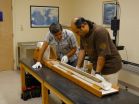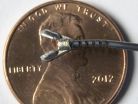The research underlines the importance of aromatase inhibitors in the treatment of oestrogen receptor (ER)-positive breast cancer - and shows they reduce risk of death by significantly more than the older hormonal treatment tamoxifen.
The study, published in The Lancet today (Friday), is relevant to postmenopausal women with ER-positive breast cancer, which accounts for over 80 per cent of cases which occur after the menopause. Each trial had used both aromatase inhibitors and tamoxifen at various times during the course of treatment.
In the study, researchers from the Aromatase Inhibitors Overview Group - chaired by Professor Mitch Dowsett at The Institute of Cancer Research, London and The Royal Marsden NHS Foundation Trust - collaborated with colleagues at the Clinical Trials Service Unit at The University of Oxford, to combine the results from 31,920 women in nine clinical trials.
The study was funded by Cancer Research UK and the Medical Research Council and conducted under the umbrella of the Early Breast Cancer Trialists Collaborative Group.
Aromatase inhibitors suppress the synthesis of oestrogens and are taken by postmenopausal women with hormone-sensitive (ER-positive) breast cancer. They have previously been reported to reduce the risk of recurrence more effectively than tamoxifen, but improvements in survival had not been demonstrated.
The current study showed that taking aromatase inhibitors for five years reduced the risk of postmenopausal women with ER positive breast cancer dying of their disease by 40 per cent within 10 years of starting treatment, compared with no hormonal treatment. This compares with the 30 per cent reduction achieved by taking tamoxifen for five years.
Current clinical guidelines reflect the uncertainty in when to use aromatase inhibitors or tamoxifen in the course of treatment - but the new study could help clarify these recommendations.
Study lead author Professor Mitch Dowsett, Head of the Academic Department of Biochemistry and of the Centre for Molecular Pathology at The Royal Marsden and The Institute of Cancer Research, London, said:
"Our global collaboration has revealed that the risk of postmenopausal women with the most common form of breast cancer dying of their disease is reduced by 40 per cent by taking five years of an aromatase inhibitor - a significantly greater protection than that offered by tamoxifen.
"Aromatase inhibitors remove only the tiny amount of oestrogen that remains in the circulation of women after the menopause - but that's enough to have a substantial impact on a wide range of ER-positive tumours, despite their extraordinary differences at the molecular level.
"But aromatase inhibitor treatment is not free of side-effects, and it's important to ensure that women with significant side-effects are supported to try to continue to take treatment and fully benefit from it."
Professor Paul Workman, Chief Executive of The Institute of Cancer Research, London, said: "The evidence on aromatase inhibitors has been accumulating for well over a decade, but it has taken this huge and complex study to make sense of all the data, and provide a firm basis for clinical guidelines.
"It tends to be the discovery of new treatments that grabs the headlines, but it is just as important to maximise the benefit patients get from existing treatments, through major, practice-changing studies like this."
Professor Ian Smith, Head of the Breast Unit at The Royal Marsden, said: "The Royal Marsden is particularly pleased at this major advance for women with breast cancer everywhere, as we were the main team involved in the development of letrozole, one of the most effective of the aromatase inhibitors. This drug is now widely used around the world and it is gratifying to think of how many thousands of lives have been saved with it over the years."
The study is published in The Lancet alongside another major breast cancer study of a different drug type - called bisphosphonates - led by researchers at Oxford and the University of Sheffield and also funded by Cancer Research UK and the Medical Research Council.
Commenting on both studies, Nell Barrie, Cancer Research UK's senior science information manager, said: "These two studies give further evidence that aromatase inhibitors and bisphosphonates - both currently available treatments - help prevent breast cancer coming back in women who have been through the menopause. Both these studies, supported by Cancer Research UK, highlight how improvement in cancer treatment is made through painstaking hard work and the collection of many years of data, before clear trends start to emerge.
"Bisphosphonates help keep bones healthy, and these results show they reduce the chance of breast cancer returning in the bones in post-menopausal women. Aromatase inhibitors block the body's ability to make oestrogen, which can fuel the growth of breast cancer, and these results confirm that they can help to stop the disease from returning after treatment."
The Institute of Cancer Research (ICR) and The Royal Marsden played a leading role in earlier as well as the current clinical trials that demonstrated the effectiveness of aromatase inhibitors in breast cancer, and in identifying and validating biomarkers to determine who could benefit. These studies supported the recommendation by NICE that the drugs should be first-line hormone treatment for certain women after surgery.
The study follows on from another recent study led by Professor Dowsett which indicated that women with high levels of the oestrogen receptor might benefit from extended treatment with hormone therapy - which usually stops after five years.
INFORMATION:
Notes to editors
For more information contact Claire Hastings on 020 7153 5380 or chastings@icr.ac.uk. For enquiries out of hours, please call 07595 963 613.
The Institute of Cancer Research, London, is one of the world's most influential cancer research institutes.
Scientists and clinicians at The Institute of Cancer Research (ICR) are working every day to make a real impact on cancer patients' lives. Through its unique partnership with The Royal Marsden NHS Foundation Trust and 'bench-to-bedside' approach, the ICR is able to create and deliver results in a way that other institutions cannot. Together the two organisations are rated in the top four cancer centres globally.
The ICR has an outstanding record of achievement dating back more than 100 years. It provided the first convincing evidence that DNA damage is the basic cause of cancer, laying the foundation for the now universally accepted idea that cancer is a genetic disease. Today it leads the world at isolating cancer-related genes and discovering new targeted drugs for personalised cancer treatment.
As a college of the University of London, the ICR provides postgraduate higher education of international distinction. It has charitable status and relies on support from partner organisations, charities and the general public.
The ICR's mission is to make the discoveries that defeat cancer. For more information visit http://www.icr.ac.uk
About The Royal Marsden NHS Foundation Trust
The Royal Marsden opened its doors in 1851 as the world's first hospital dedicated to cancer diagnosis, treatment, research and education.
Today, together with its academic partner, The Institute of Cancer Research (ICR), it is the largest and most comprehensive cancer centre in Europe treating over 50,000 NHS and private patients every year. It is a centre of excellence with an international reputation for groundbreaking research and pioneering the very latest in cancer treatments and technologies.
The Royal Marsden, with the ICR, is the only National Institute for Health Research Biomedical Research Centre for Cancer. First awarded the status in 2006, it was re-awarded in 2011. A total of £62 million is being provided over five years, to support pioneering research work, and is being shared out over eight different cancer themes.
The Royal Marsden also provides community services in the London boroughs of Sutton and Merton and in June 2010, along with the ICR, the Trust launched a new academic partnership with Mount Vernon Cancer Centre in Middlesex.
Since 2004, the hospital's charity, The Royal Marsden Cancer Charity, has helped raise over £100 million to build theatres, diagnostic centres, and drug development units.
Prince William became President of The Royal Marsden in 2007, following a long royal connection with the hospital.
About Cancer Research UK
Cancer Research UK is the world's leading cancer charity dedicated to saving lives through research.
Cancer Research UK's pioneering work into the prevention, diagnosis and treatment of cancer has helped save millions of lives.
Cancer Research UK receives no government funding for its life-saving research. Every step it makes towards beating cancer relies on every pound donated.
Cancer Research UK has been at the heart of the progress that has already seen survival rates in the UK double in the last forty years.
Today, 2 in 4 people survive cancer. Cancer Research UK's ambition is to accelerate progress so that 3 in 4 people will survive cancer within the next 20 years.
Cancer Research UK supports research into all aspects of cancer through the work of over 4,000 scientists, doctors and nurses.
Together with its partners and supporters, Cancer Research UK's vision is to bring forward the day when all cancers are cured.
For further information about Cancer Research UK's work or to find out how to support the charity, please call 0300 123 1022 or visit http://www.cancerresearchuk.org. Follow us on Twitter and Facebook.
About the Medical Research Council
The Medical Research Council has been at the forefront of scientific discovery to improve human health. Founded in 1913 to tackle tuberculosis, the MRC now invests taxpayers' money in some of the best medical research in the world across every area of health. Twenty-nine MRC-funded researchers have won Nobel prizes in a wide range of disciplines, and MRC scientists have been behind such diverse discoveries as vitamins, the structure of DNA and the link between smoking and cancer, as well as achievements such as pioneering the use of randomised controlled trials, the invention of MRI scanning, and the development of a group of antibodies used in the making of some of the most successful drugs ever developed. Today, MRC-funded scientists tackle some of the greatest health problems facing humanity in the 21st century, from the rising tide of chronic diseases associated with ageing to the threats posed by rapidly mutating micro-organisms. http://www.mrc.ac.uk




